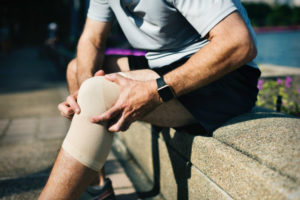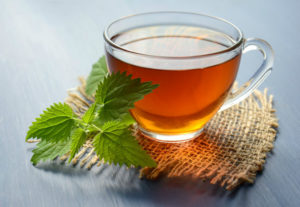The amino acid that’s commonly found in green tea and supplements, has been shown to benefit the body and mind in various ways. From gut health to mental alertness. And even – enhanced sports recovery.
L-Theanine does this by stimulating brain activity and preventing the onset of common infections by increasing white blood cell count – strengthening your defences.
Furthermore, by reducing oxidative stress that builds up during and after exercise, means you’ll be able to train more frequently – all thanks to l-theanine supplementation.
Table of Contents
Benefits of L-Theanine on Reducing Inflammation
 I’m sure you’ve felt it at one time or another. After a heavy training session, your body aches and swells, and there seems to be pain all over. Sometimes lasting for days.
I’m sure you’ve felt it at one time or another. After a heavy training session, your body aches and swells, and there seems to be pain all over. Sometimes lasting for days.
This, my friend, is partly down to inflammation – an overlooked symptom of exercise and a stress-induced lifestyle. And believe it or not, inflammation can cause a number of health issues to arise if left unattended – not only aches and pains after exercise.
L-Theanine has been shown to reduce oxidative stress in the body when used continuously. It works to enhance your body’s ability to regulate inflammation – flushing out toxins from your body.
Benefits of L-Theanine on Inflammation:
- Faster recovery – By lowering inflammation, you’ll allow your body to flush out unwanted toxins that build up from exercise and stress. This will enhance your recovery significantly. L-theanine does this as it contains antioxidants which lower inflammation throughout the body.
- Increased immunity – L-Theanine has been shown to increase white blood cell count, which is the main defence in your body that helps to fight off illnesses and infections. The more white blood cells you have, the stronger your immunity will be – which further helps muscle and cell recovery.
Other benefits of L-Theanine Supplementation:
- Better cognition – L-Theanine, in some cases, is known as a nootropic. It can help your mind to work faster – increasing focus by stimulating the activity of GABA gamma-Aminobutyric acid. GABA is a neurotransmitter linked to better cognition.
- Reduced stress – While coffee my give you a short term buzz. L-theanine on the other hand, works to energize your body without causing anxiety to rise – or a large spike and crash in energy levels. This is partly in the way that l-theanine increases serotonin levels, helping you to be focused, yet relaxed.
Read more information on L-Theanine here.
Study on l-Theanine and Reduced Inflammation:
As for the study which tested L-theanine’s effects on lowering inflammation. A group of researcher tested 20 members of the Polish rowing team. The study lasted 6 weeks while using 150 mg of L-theanine supplementation daily.
 At the beginning of the study, they asked the rowers to complete a 2000m rowing test while measuring stress levels, inflammation biomarkers, along with standard blood tests etc.
At the beginning of the study, they asked the rowers to complete a 2000m rowing test while measuring stress levels, inflammation biomarkers, along with standard blood tests etc.
Then, the rowers used l-theanine daily for 6 weeks while carrying on with normal daily activities. At the end of the 6 weeks, the rowers completed a final test – again, 2000m monitored rowing.
 It was found that inflammation was significantly reduced. This was due to the absence of IL-10 (a cytokine responsible for lowering inflammation). Which then highlights that l-theanine worked as a buffer against the onset of inflammation in the first instance – preventing the release of IL-10.
It was found that inflammation was significantly reduced. This was due to the absence of IL-10 (a cytokine responsible for lowering inflammation). Which then highlights that l-theanine worked as a buffer against the onset of inflammation in the first instance – preventing the release of IL-10.Subsequently, because IL-10 was decreased, IL-2 to IL-09 were, on the other hand, increased. These cytokines (IL-2 to IL-09) are responsible for increased immunity in the body by multiplying white blood cell count. (I)
To summarise; thanks to the lowered amount of IL-10, a rise in other cytokines were allowed to flourish. Which then points to the fact that l-theanine does in fact, lower inflammation, whilst increasing immune health throughout the body.
How Much Theanine To Lower Inflammation?
 As we can see from the above study, using 150 mg daily for 6 weeks has been shown to lower inflammation while increasing immune health. This dose recommendation is a good place to start if you want to see results in faster muscle repair post-exercise.
As we can see from the above study, using 150 mg daily for 6 weeks has been shown to lower inflammation while increasing immune health. This dose recommendation is a good place to start if you want to see results in faster muscle repair post-exercise.
Whilst on the topic of l-theanine for recovery, you might want to read my article on l-theanine post-exercise for increased mental performance and alertness. You can read that article here – L-Theanine: Improve Post-Exercise Mental Alertness.
Sport Nutrition Expert Recommendation?
 L-Theanine, whether you get it from tea or as a supplement, I highly recommend it to anyone who wants to lower stress, inflammation, or even oxidative stress after exercise – while increasing immune health.
L-Theanine, whether you get it from tea or as a supplement, I highly recommend it to anyone who wants to lower stress, inflammation, or even oxidative stress after exercise – while increasing immune health.
Furthermore, l-theanine can also help to regenerate mental energy post-exercise. It’s been studied that using as little as 50 mg of l-theanine after a workout can reduce mental fatigue by a massive 50% – see the full article here.
As for increasing recovery by lowering inflammation, using 150 mg per day consistently has been shown to be highly beneficial for active people.
If you wish to learn more about l-theanine, you can read more about its full benefits in my main article here – Benefits of L-Theanine.
References:
(I) A. Juszkiewicz, et al. “The Effect of L-Theanine Supplementation on the Immune System of Athletes Exposed to Strenuous Physical Exercise.” Journal of the International Society of Sports Nutrition, BioMed Central, 15 Feb. 2019. (source)

I’m curious if L-theanine supplementation amongst athletes will blunt training adaptations in the same way taking anti-oxidants (e.g. resveratrol, Vitamin C) or NSAIDs does? After a training session, the inflammatory response is important for adaptation, especially in a base training period (versus a competitive period). I love the cognitive benefits of l-theanine but am concerned that it could impede training adaptations. Thanks.
Hi Stephanie, that’s a very good question, and while inflammation is important for growth and repair, using l-theanine shouldn’t prevent our body’s own survival mechanism from taking place; which is to release white blood cells, which then signals for the ‘right amount’ of inflammation response required for training improvements to take place. Looking into the research, it’s still not determined whether or not using antioxidant vitamins pose an issue where performance and recovery adaptations are concerned. What I will say, however, is that those studies showing negative results using these vitamins were on the higher dose scale at 1g of vitamin C per day. This could, therefore, be the issue. Instead, we should look to drip feed our body with smaller doses of vitamins to make sure or body is well supplied, not overdosed.
I quote one study: “unphysiological doses of antioxidant vitamin supplementation cannot be recommended, particularly on a daily basis for a long period of time. A study published in 2013 presented results showing that vitamin C and E supplementation within the physiological range (152 mg/day vitamin C and 50 mg/day vitamin E) did not reduce the training-induced adaptation in neutrophil endogenous antioxidant enzyme activities seen in the placebo group after 1 month.” (study)
You could think of it like this; L-Theanine will help to reduce inflammation, flushing out toxins etc, which will ultimately speed up recovery – but it won’t stop your body from releasing the chemicals needed for initial inflammation to take place. And yes, Vitamin C has been shown to blunt performance in some cases, but NSAIDs on the other hand, when taken from bioavailable sources and in the right doses (such as blueberries or grapefruit extract) has actually been shown to improve performance and recovery, not the opposite. Ps, like yourself, I also love using l-theanine for a mental boost. Hope this helps! Thanks!